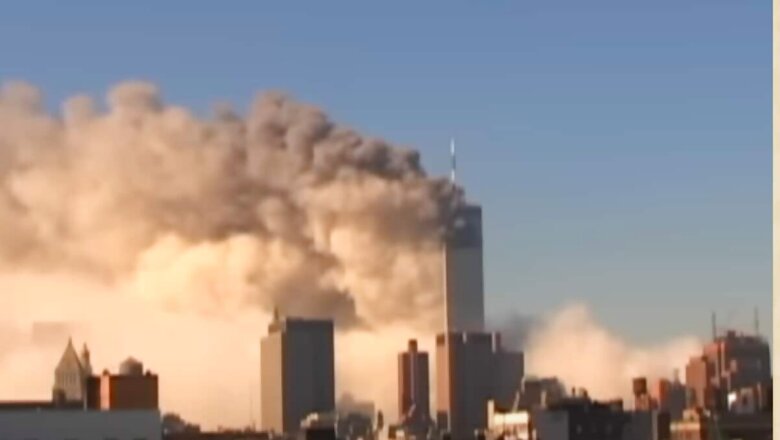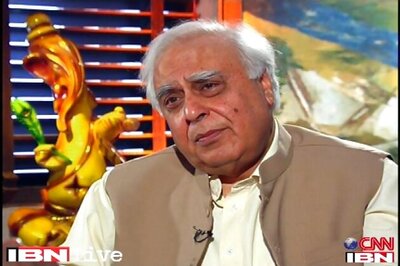
views
September 11, also known as Patriot Day, is a national day of service and remembrance in the United States. It is observed to remember the victims of the terrorist attacks on September 11, 2001. This day is also known as the September 11th National Day of Service and Remembrance or 9/11 Day.
The country pays tribute to the nearly 3,000 people who died in the attack on the World Trade Centre, the Pentagon and the crash of United Airlines Flight 93 in Pennsylvania.
Patriot Day, made a law by the US Congress on December 18, 2001, is a nationwide observance on September 11.
Several ceremonies and moments of silence, including at 8:46 AM, the time of the first attack on the North Tower of the World Trade Center, are observed.
Citizens are advised to display flags at half-staff and engage in memorial services to pay tribute to those who lost their lives and those who intervened.
The September 11 Attacks
On the morning of September 11, 2001, 19 terrorists affiliated with al-Qaeda took control of four commercial aircraft. Two of these planes were taken and flown into the Twin Towers of the World Trade Center in New York City. A third plane hit the Pentagon, the U. S. Department of Defense headquarters in Arlington, Virginia. The fourth plane, United Airlines Flight 93, was bound for Washington, D.C., but the passengers fought back to reclaim control of the plane, and the plane crashed in a Pennsylvania field.
In these attacks, about 3000 people lost their lives making this terrifying act the most devastating in the history of the United States.
U.S. Response: The War on Terror
Following 9/11, the US invaded Afghanistan in October 2001. The aim was to neutralise al-Qaeda and to oust the Taliban regime, which reportedly hosted and aided bin Laden and his group.
The US military operations were effective in overthrowing the Taliban government within weeks but the chief ringleader of the attack Osama bin Laden escaped and withdrew to the mountainous zones of Afghanistan and across the border in Pakistan.
The US government went further to launch a manhunt for bin Laden lasting many years. However, efforts to pursue as well as hunt bin Laden by instituting various military operations and intelligence were unsuccessful. He was reported to be in the tribal zones on the Afghanistan-Pakistan border.
The manhunt ended in a major operation, Operation Neptune Spear. He was finally located by US Navy SEALs on May 2, 2011, in a building complex in Abbottabad, Pakistan. All the activities that led to bin Laden’s elimination were well coordinated thereby increasing the efficiency of the operation.
The U.S. government enacted several key pieces of legislation aimed at enhancing national security:
USA PATRIOT Act: In October 2001, this act was passed to erode further the privacy of communication and financial transactions for monitoring terrorist activities. It also brought in an improved organisation of information in relation to law enforcement bodies.
Homeland Security: The Department of Homeland Security or the DHS was established only in 2003 primarily for the purpose of organising major federal organisations that had an agenda of securing the country against threats of terrorists and responding to catastrophic events. This was a marked change toward a more united federation-based response to security threats.
The attacks prompted a reevaluation of international security strategies:
After the September 11 attacks, terrorism emerged as a vital element of the US and international security strategies. Counter-terrorism measures were implemented by the United Nations and different countries since terrorism was identified as a major threat globally.
Military Engagement: Due to the acts of terrorism, especially the 9/11 attacks, the US declared war on terror and invaded Afghanistan and Iraq. This action was initially backed by most Americans who felt that it was the right proactive measure against terrorism.
Nevertheless, the reasons for the invasion of Iraq in 2003 were that the country had weapons of mass destruction (WMDs) and links with al-Qaeda. However, the 9/11 Commission could not find any link between Saddam Hussein and al-Queda, and no weapons of mass destruction were found in Iraq.
The initial enthusiasm of the public evolved to disillusionment mainly because the wars stretched beyond anyone’s imagination, more soldiers were deployed and died than what was anticipated earlier.
In this case, the level of dissatisfaction with the US involvement in Afghanistan was very high as reflected by the fact that by 2021, over two-thirds of Americans surveyed by the Pew Research Center were of the opinion that the country had not achieved its objectives in Afghanistan.



















Comments
0 comment